 If you’ve read my writings about Lost, you probably know that I believe it’s more than just a show: Lost contains hidden messages about how the world really works. That’s right, I sincerely believe that a TV series is giving us clues that can help us understand the mysteries of life. Well, if that were true, shouldn’t Lost include this little tidbit within its own mythology? Shouldn’t it demonstrate how the media can provide answers to our own life challenges so that we’ll know to look there to find them? Yes, I believe it should, and to be honest, I’ve been wondering if it was ever going to do so. In “Some Like It Hoth,” I finally received my answer.
If you’ve read my writings about Lost, you probably know that I believe it’s more than just a show: Lost contains hidden messages about how the world really works. That’s right, I sincerely believe that a TV series is giving us clues that can help us understand the mysteries of life. Well, if that were true, shouldn’t Lost include this little tidbit within its own mythology? Shouldn’t it demonstrate how the media can provide answers to our own life challenges so that we’ll know to look there to find them? Yes, I believe it should, and to be honest, I’ve been wondering if it was ever going to do so. In “Some Like It Hoth,” I finally received my answer.
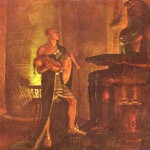 Perhaps the most ironic theme of “Dead Is Dead” is that it actually seems to imply anything but. The episode is more about the futility of death, rather than its finality, yet, I don’t think this is its ultimate message. The message in its fullest form is that dead is only dead if your services will no longer be needed.
Perhaps the most ironic theme of “Dead Is Dead” is that it actually seems to imply anything but. The episode is more about the futility of death, rather than its finality, yet, I don’t think this is its ultimate message. The message in its fullest form is that dead is only dead if your services will no longer be needed.
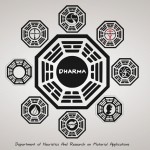 Before I go to sleep at night, sometimes I ask the universe a question about my destiny. The answer, as bizarre as it may seem, usually comes in the form of a song that wakes me up on my clock radio the next morning. While I haven’t done this in awhile, last night I once again had the urge. I asked the universe (God, the light, soul guides, my future self, whatever you wanna call it) what is going to happen on December 22, 2012—the day after the Mayan calendar abruptly ends. The answer I received really surprised me.
Before I go to sleep at night, sometimes I ask the universe a question about my destiny. The answer, as bizarre as it may seem, usually comes in the form of a song that wakes me up on my clock radio the next morning. While I haven’t done this in awhile, last night I once again had the urge. I asked the universe (God, the light, soul guides, my future self, whatever you wanna call it) what is going to happen on December 22, 2012—the day after the Mayan calendar abruptly ends. The answer I received really surprised me.
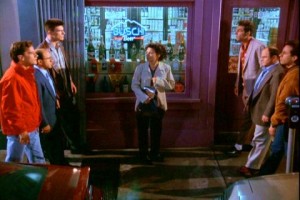 The concept behind Lost’s “He’s Our You” is that different people or things in our lives often take on very similar roles. In other words, multiple actors often play the same character in the movie that is your life experience. This intriguing concept actually reminds me of an episode of Seinfeld I first saw years ago. In “The Bizarro Jerry,” Elaine breaks up with a boyfriend but they decide to remain friends—similar to her relationship with Jerry whom she’d also dated prior to becoming friends. Comically, it turns out that this “Bizarro Jerry” has…
The concept behind Lost’s “He’s Our You” is that different people or things in our lives often take on very similar roles. In other words, multiple actors often play the same character in the movie that is your life experience. This intriguing concept actually reminds me of an episode of Seinfeld I first saw years ago. In “The Bizarro Jerry,” Elaine breaks up with a boyfriend but they decide to remain friends—similar to her relationship with Jerry whom she’d also dated prior to becoming friends. Comically, it turns out that this “Bizarro Jerry” has…
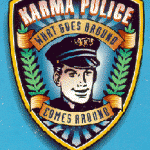 As you’ve probably noticed, the title of a Lost episode often hints at more than just the episode’s story on a surface level. Many times, it provides a clue to its mythological messages as well. This was true of “316,” of “LaFleur,”* and now of “Namaste.” While Buddhist/Hindu principles pop up in Lost every so often, I was hoping that they might be a major theme of this episode due to its title, and I was not disappointed.
As you’ve probably noticed, the title of a Lost episode often hints at more than just the episode’s story on a surface level. Many times, it provides a clue to its mythological messages as well. This was true of “316,” of “LaFleur,”* and now of “Namaste.” While Buddhist/Hindu principles pop up in Lost every so often, I was hoping that they might be a major theme of this episode due to its title, and I was not disappointed.
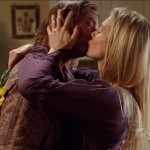 For a show that’s been such a cornucopia of mythological goodness, it’s pretty surprising that Lost hasn’t spent much time exploring the one theme that is the foundation of most classic myths—love. Oh sure, we’ve seen plenty of love triangles and quadrangles, and forbidden love has come up from time to time along with lost love, but the mysterious ways in which love works has not really been explored to any major extent. That is, until Lost’s 91st episode, “LaFleur.”
For a show that’s been such a cornucopia of mythological goodness, it’s pretty surprising that Lost hasn’t spent much time exploring the one theme that is the foundation of most classic myths—love. Oh sure, we’ve seen plenty of love triangles and quadrangles, and forbidden love has come up from time to time along with lost love, but the mysterious ways in which love works has not really been explored to any major extent. That is, until Lost’s 91st episode, “LaFleur.”
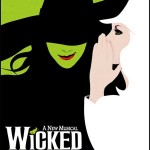 When I think about the TV shows and movies I used to watch as a kid, it was always very easy to tell who was good and who was bad. Superman—good. Lex Luthor—bad. Mike Brady—good. The dude who faked whiplash to win a case against Carol—bad. The Scooby gang—good. The masked villains who would’ve gotten away with their dastardly schemes had it not been for those blasted kids—bad. Looking back at it now, I honestly think this black and white view of the world tainted my perception of people and experiences. Teachers and kids were either good or bad. A hot lunch choice was either good or bad. My day was either good or bad. And because I grew up thinking this way, much of this mindset is still with me, for better or for worse.
When I think about the TV shows and movies I used to watch as a kid, it was always very easy to tell who was good and who was bad. Superman—good. Lex Luthor—bad. Mike Brady—good. The dude who faked whiplash to win a case against Carol—bad. The Scooby gang—good. The masked villains who would’ve gotten away with their dastardly schemes had it not been for those blasted kids—bad. Looking back at it now, I honestly think this black and white view of the world tainted my perception of people and experiences. Teachers and kids were either good or bad. A hot lunch choice was either good or bad. My day was either good or bad. And because I grew up thinking this way, much of this mindset is still with me, for better or for worse.
 The concept of taking a leap of faith has been covered many times on Lost. Locke had told Jack that he was taking a leap of faith by pressing the button; Hurley took a leap of faith by risking his life with Charlie to get the DHARMA van started as it sped down a hill; and in the episode titled, “316,” the theme shows up throughout. In fact, the title itself should’ve been the first tip-off.
The concept of taking a leap of faith has been covered many times on Lost. Locke had told Jack that he was taking a leap of faith by pressing the button; Hurley took a leap of faith by risking his life with Charlie to get the DHARMA van started as it sped down a hill; and in the episode titled, “316,” the theme shows up throughout. In fact, the title itself should’ve been the first tip-off.
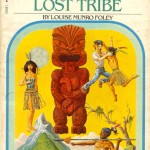 While most mythological stories explore at least one or two truths about the way our world works, Lost is unique in that it explores hundreds of them. It’s almost as if Lost is a spiritual guidebook to life. While I sometimes joke around about it, I’m beginning to truly believe that fans of the show will be better equipped to handle the strange new world we are going to inherit in the upcoming years. Whether consciously or subconsciously, it is almost as if Lost is training us to be able to mentally handle the future. The Good Book says that the meek shall inherit the earth. Perhaps it was referring to Lost geeks.
While most mythological stories explore at least one or two truths about the way our world works, Lost is unique in that it explores hundreds of them. It’s almost as if Lost is a spiritual guidebook to life. While I sometimes joke around about it, I’m beginning to truly believe that fans of the show will be better equipped to handle the strange new world we are going to inherit in the upcoming years. Whether consciously or subconsciously, it is almost as if Lost is training us to be able to mentally handle the future. The Good Book says that the meek shall inherit the earth. Perhaps it was referring to Lost geeks.
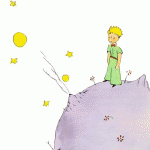 The Little Prince by Antoine De Saint-Exupéry is the first “grown-up” book I ever read. Which is ironic because it’s a children’s book about how we should never lose our sense of child-like wonder. Actually, the book is about a million different things and about absolutely nothing. While much of the mythology went over my head when I’d originally read the book as a kid, the story’s rich symbolism and metaphor made that fact pretty apparent. Even back then, I knew there was a lot going on in the book that I didn’t understand. I actually read the book again a few years ago after reading The Alchemist by Paulo Coelho because the story reminded me of it. I think I understand it a little better now, but will probably have to read it again in another 30 years or so. Something tells me that when I read it a final time as an old man, I will realize that I understood it the clearest when I was a kid. And that’s sort of the point.
The Little Prince by Antoine De Saint-Exupéry is the first “grown-up” book I ever read. Which is ironic because it’s a children’s book about how we should never lose our sense of child-like wonder. Actually, the book is about a million different things and about absolutely nothing. While much of the mythology went over my head when I’d originally read the book as a kid, the story’s rich symbolism and metaphor made that fact pretty apparent. Even back then, I knew there was a lot going on in the book that I didn’t understand. I actually read the book again a few years ago after reading The Alchemist by Paulo Coelho because the story reminded me of it. I think I understand it a little better now, but will probably have to read it again in another 30 years or so. Something tells me that when I read it a final time as an old man, I will realize that I understood it the clearest when I was a kid. And that’s sort of the point.
 If you’ve read my writings about Lost, you probably know that I believe it’s more than just a show: Lost contains hidden messages about how the world really works. That’s right, I sincerely believe that a TV series is giving us clues that can help us understand the mysteries of life. Well, if that were true, shouldn’t Lost include this little tidbit within its own mythology? Shouldn’t it demonstrate how the media can provide answers to our own life challenges so that we’ll know to look there to find them? Yes, I believe it should, and to be honest, I’ve been wondering if it was ever going to do so. In “Some Like It Hoth,” I finally received my answer.
If you’ve read my writings about Lost, you probably know that I believe it’s more than just a show: Lost contains hidden messages about how the world really works. That’s right, I sincerely believe that a TV series is giving us clues that can help us understand the mysteries of life. Well, if that were true, shouldn’t Lost include this little tidbit within its own mythology? Shouldn’t it demonstrate how the media can provide answers to our own life challenges so that we’ll know to look there to find them? Yes, I believe it should, and to be honest, I’ve been wondering if it was ever going to do so. In “Some Like It Hoth,” I finally received my answer. Perhaps the most ironic theme of “Dead Is Dead” is that it actually seems to imply anything but. The episode is more about the futility of death, rather than its finality, yet, I don’t think this is its ultimate message. The message in its fullest form is that dead is only dead if your services will no longer be needed.
Perhaps the most ironic theme of “Dead Is Dead” is that it actually seems to imply anything but. The episode is more about the futility of death, rather than its finality, yet, I don’t think this is its ultimate message. The message in its fullest form is that dead is only dead if your services will no longer be needed. Before I go to sleep at night, sometimes I ask the universe a question about my destiny. The answer, as bizarre as it may seem, usually comes in the form of a song that wakes me up on my clock radio the next morning. While I haven’t done this in awhile, last night I once again had the urge. I asked the universe (God, the light, soul guides, my future self, whatever you wanna call it) what is going to happen on December 22, 2012—the day after the Mayan calendar abruptly ends. The answer I received really surprised me.
Before I go to sleep at night, sometimes I ask the universe a question about my destiny. The answer, as bizarre as it may seem, usually comes in the form of a song that wakes me up on my clock radio the next morning. While I haven’t done this in awhile, last night I once again had the urge. I asked the universe (God, the light, soul guides, my future self, whatever you wanna call it) what is going to happen on December 22, 2012—the day after the Mayan calendar abruptly ends. The answer I received really surprised me. The concept behind Lost’s “He’s Our You” is that different people or things in our lives often take on very similar roles. In other words, multiple actors often play the same character in the movie that is your life experience. This intriguing concept actually reminds me of an episode of Seinfeld I first saw years ago. In “The Bizarro Jerry,” Elaine breaks up with a boyfriend but they decide to remain friends—similar to her relationship with Jerry whom she’d also dated prior to becoming friends. Comically, it turns out that this “Bizarro Jerry” has…
The concept behind Lost’s “He’s Our You” is that different people or things in our lives often take on very similar roles. In other words, multiple actors often play the same character in the movie that is your life experience. This intriguing concept actually reminds me of an episode of Seinfeld I first saw years ago. In “The Bizarro Jerry,” Elaine breaks up with a boyfriend but they decide to remain friends—similar to her relationship with Jerry whom she’d also dated prior to becoming friends. Comically, it turns out that this “Bizarro Jerry” has… As you’ve probably noticed, the title of a Lost episode often hints at more than just the episode’s story on a surface level. Many times, it provides a clue to its mythological messages as well. This was true of “316,” of “LaFleur,”* and now of “Namaste.” While Buddhist/Hindu principles pop up in Lost every so often, I was hoping that they might be a major theme of this episode due to its title, and I was not disappointed.
As you’ve probably noticed, the title of a Lost episode often hints at more than just the episode’s story on a surface level. Many times, it provides a clue to its mythological messages as well. This was true of “316,” of “LaFleur,”* and now of “Namaste.” While Buddhist/Hindu principles pop up in Lost every so often, I was hoping that they might be a major theme of this episode due to its title, and I was not disappointed. For a show that’s been such a cornucopia of mythological goodness, it’s pretty surprising that Lost hasn’t spent much time exploring the one theme that is the foundation of most classic myths—love. Oh sure, we’ve seen plenty of love triangles and quadrangles, and forbidden love has come up from time to time along with lost love, but the mysterious ways in which love works has not really been explored to any major extent. That is, until Lost’s 91st episode, “LaFleur.”
For a show that’s been such a cornucopia of mythological goodness, it’s pretty surprising that Lost hasn’t spent much time exploring the one theme that is the foundation of most classic myths—love. Oh sure, we’ve seen plenty of love triangles and quadrangles, and forbidden love has come up from time to time along with lost love, but the mysterious ways in which love works has not really been explored to any major extent. That is, until Lost’s 91st episode, “LaFleur.” When I think about the TV shows and movies I used to watch as a kid, it was always very easy to tell who was good and who was bad. Superman—good. Lex Luthor—bad. Mike Brady—good. The dude who faked whiplash to win a case against Carol—bad. The Scooby gang—good. The masked villains who would’ve gotten away with their dastardly schemes had it not been for those blasted kids—bad. Looking back at it now, I honestly think this black and white view of the world tainted my perception of people and experiences. Teachers and kids were either good or bad. A hot lunch choice was either good or bad. My day was either good or bad. And because I grew up thinking this way, much of this mindset is still with me, for better or for worse.
When I think about the TV shows and movies I used to watch as a kid, it was always very easy to tell who was good and who was bad. Superman—good. Lex Luthor—bad. Mike Brady—good. The dude who faked whiplash to win a case against Carol—bad. The Scooby gang—good. The masked villains who would’ve gotten away with their dastardly schemes had it not been for those blasted kids—bad. Looking back at it now, I honestly think this black and white view of the world tainted my perception of people and experiences. Teachers and kids were either good or bad. A hot lunch choice was either good or bad. My day was either good or bad. And because I grew up thinking this way, much of this mindset is still with me, for better or for worse. The concept of taking a leap of faith has been covered many times on Lost. Locke had told Jack that he was taking a leap of faith by pressing the button; Hurley took a leap of faith by risking his life with Charlie to get the DHARMA van started as it sped down a hill; and in the episode titled, “316,” the theme shows up throughout. In fact, the title itself should’ve been the first tip-off.
The concept of taking a leap of faith has been covered many times on Lost. Locke had told Jack that he was taking a leap of faith by pressing the button; Hurley took a leap of faith by risking his life with Charlie to get the DHARMA van started as it sped down a hill; and in the episode titled, “316,” the theme shows up throughout. In fact, the title itself should’ve been the first tip-off. While most mythological stories explore at least one or two truths about the way our world works, Lost is unique in that it explores hundreds of them. It’s almost as if Lost is a spiritual guidebook to life. While I sometimes joke around about it, I’m beginning to truly believe that fans of the show will be better equipped to handle the strange new world we are going to inherit in the upcoming years. Whether consciously or subconsciously, it is almost as if Lost is training us to be able to mentally handle the future. The Good Book says that the meek shall inherit the earth. Perhaps it was referring to Lost geeks.
While most mythological stories explore at least one or two truths about the way our world works, Lost is unique in that it explores hundreds of them. It’s almost as if Lost is a spiritual guidebook to life. While I sometimes joke around about it, I’m beginning to truly believe that fans of the show will be better equipped to handle the strange new world we are going to inherit in the upcoming years. Whether consciously or subconsciously, it is almost as if Lost is training us to be able to mentally handle the future. The Good Book says that the meek shall inherit the earth. Perhaps it was referring to Lost geeks. The Little Prince by Antoine De Saint-Exupéry is the first “grown-up” book I ever read. Which is ironic because it’s a children’s book about how we should never lose our sense of child-like wonder. Actually, the book is about a million different things and about absolutely nothing. While much of the mythology went over my head when I’d originally read the book as a kid, the story’s rich symbolism and metaphor made that fact pretty apparent. Even back then, I knew there was a lot going on in the book that I didn’t understand. I actually read the book again a few years ago after reading The Alchemist by Paulo Coelho because the story reminded me of it. I think I understand it a little better now, but will probably have to read it again in another 30 years or so. Something tells me that when I read it a final time as an old man, I will realize that I understood it the clearest when I was a kid. And that’s sort of the point.
The Little Prince by Antoine De Saint-Exupéry is the first “grown-up” book I ever read. Which is ironic because it’s a children’s book about how we should never lose our sense of child-like wonder. Actually, the book is about a million different things and about absolutely nothing. While much of the mythology went over my head when I’d originally read the book as a kid, the story’s rich symbolism and metaphor made that fact pretty apparent. Even back then, I knew there was a lot going on in the book that I didn’t understand. I actually read the book again a few years ago after reading The Alchemist by Paulo Coelho because the story reminded me of it. I think I understand it a little better now, but will probably have to read it again in another 30 years or so. Something tells me that when I read it a final time as an old man, I will realize that I understood it the clearest when I was a kid. And that’s sort of the point.
